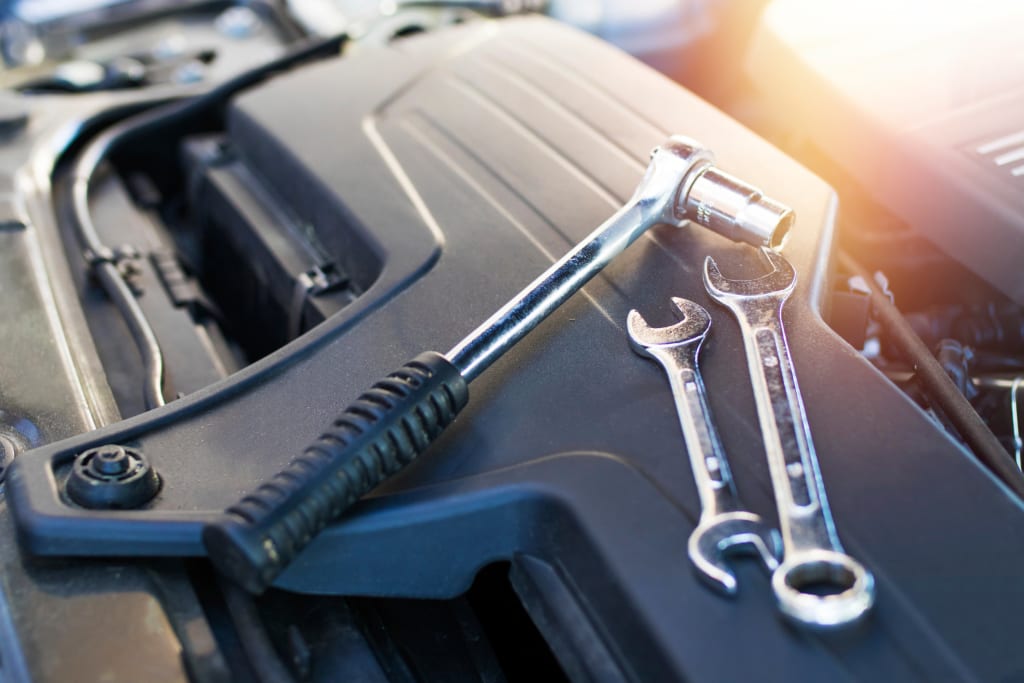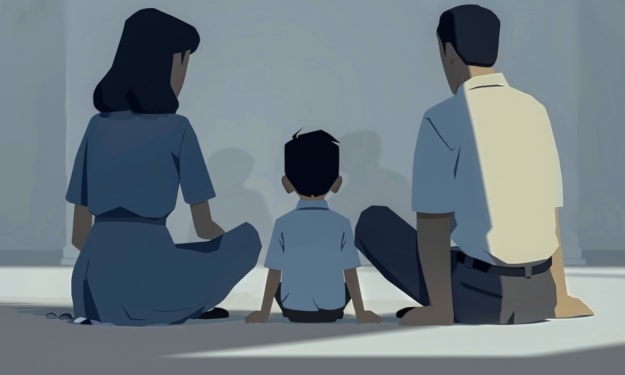
I am not an ASE certified mechanic. I am not a professional. I don’t get paid for my work.
“My father taught me everything I know about cars.”
I say that often, but it’s not entirely true. That sentiment discounts everything I’ve learned on my own, away from my father’s garage. A more accurate statement would be, “My father taught me how to work on cars when I was a kid.” The things I learned after entering adulthood, which for me meant joining the army, I learned through trial and error.
When I visited my dad each summer, as granted by my parents’ divorce, I would watch him work on cars. Some of the cars were his, and others belonged to his military friends. Dad’s daily driver was an old 2-seater Ford pickup. The Rust Rod, he used to call it. I didn’t know what rust was exactly, but it looked cool and made a loud growl when he drove it. Another vehicle belonged to my stepmother. It was a white hatchback with blue cloth seats. I would later learn that it was a 1980 Chevy Chevette, and it was the car that my brother and I shared once we started driving. The third and final car in my dad’s garage was a 1984 Chevy Monte Carlo, and it was my favorite. It was fast, it was loud, and it made him smile when he drove it.
On any given summer day, my dad had a car in the garage, raised up and resting on jack stands. I remember the intoxicating smell of his garage: a mix of cigarette smoke, engine oil, and beer. He had a black boombox on top of the beer fridge which played ancient-looking cassettes of his favorite bands. Above the fridge hung a red and white Budweiser flag. It was in this garage where I would first take a wrench to a car.
In the summer of 1987, I was seated on the barstool next to the beer fridge watching my dad lift the Chevette. As dad finished, he looked up at me and asked if I wanted to change the oil with him. I was so excited that I fell off the stool. I jumped up and dusted myself off.
“Yes!”
Over the two hours, my dad walked me through the entire process of changing the oil on that car. Any car, for that matter. He explained the differences in oil viscosity, which I partly understood. He explained why cars needed oil, and why oil needed to be changed. Even today, I hear snippets of his voice when I’m working on cars.
Check manual, son, to make sure you know what kind and how much oil to use. Always open the oil cap on top of the engine, it will drain better. When you take off the drain plug, the oil will be hot. Taking off oil filters can be messy. Wear your eye protection. Make sure to put some oil on the new oil filter’s gasket - it will set better. Never put in more oil than the car needs, or you’ll break it.
All of these words, these lessons he’d learned in life, he passed on as he initiated me into the world of do-it-yourself auto work. Sure, I couldn’t loosen or tighten anything because I was a welp of a kid, but I did what I could, and I felt like I’d just conquered the world. As the summer progressed, I helped change the oil in the other two cars. I identified here a sense of sufficiency, a place to belong, or a place to work. It was productivity on the smallest of scales.
During the following summer, I learned how to change the brakes on Dad’s Monte Carlo. This job was remarkably more difficult to do. I’d watched him do it before, but this time was different because I would be the one swearing at the car, as if it was preventing me from getting the drums off. Or I would bust my knuckles on the wheel hub and then spend the next few minutes pacing back and forth outside the garage, shaking my hand up and down in front of me like I’d witnessed when it happened to him. It was more difficult because I would be the one shooting brake springs across the garage, plinking them off the fridge and countless empty beer cans scattered about the garage.
It was most difficult because my dad didn’t do it for me. Before I started, he took the time to show me how to change the drum brakes. Using one of the drums as a hands-on classroom, he walked me through the process a few times, slowly, so I could ask questions. Then, he turned me loose on the other drum. I emulated everything I could remember, and I made some mistakes. My dad, perched on the barstool and drinking beer, watched me closely and interjected only when I’d gone too far off course.
Is that where that goes?
Keep your hands away from your eyes, they got brake dust on ‘em.
Don’t lose my springs!
Flip those brake shoes around.
Damn, boy, why are you crying?
I cried a few times. Once because I couldn’t find a spring that I launched outside. Another time because my fingers got pinched inside the wheel hub. But all the other times I cried because I felt like a failure. I couldn’t do the job as easily as my dad, and I wanted to quit.
This led to one of the first serious discussions I would have with my father. Yes, this was a hard job to do. Yes, this was my first time doing it. Quitting, however, was not an option.
“Cain’t never could, son!”
This, I suppose, was something he’d been told before when he uttered the words 'I can’t'. It didn’t make sense then, but it did later. Presumably, someone who says they can’t do something, couldn’t do it in the first place. It was an anomalous phrase I would hear over the course of my path to adulthood, and one I would eventually throw at my own kids.
These damn brakes. With the wheel as my stool, I observed the mess I’d made inside the wheel well. A bungee cord secured the caliper to the rear spring. I had brake shoes shaped like big asbestos smiles, and I couldn’t get them to stay in place. I had springs of different sizes, and I wasn’t sure where they were supposed to go. I hung my head and watched drops of sweat fall onto the parched concrete floor.
Then I stood up shaking my head and walked to the other side of the pearl white coupe. With brake springs in hand, I studied the drum my father had assembled. I held them up to his springs, turning them until I could see how they fit into place. I did the same with the drum shoes, moving them through all dimensions and angles until I saw how they fit with the springs. A few minutes later, I carried my pieces back to the other side and huddled around the drum.
I did get the brakes on the car, and I did it all on my own. My father gave me room to fail, and I loved him for it. I knew what needed to happen, and I knew there was a process. But until I figured it out, the job remained undone. Once I reassembled the wheel hub, my father stood up, inspected the work, and hugged me. Every brake job after that was easy.
When I turned thirteen, I made the decision to live with my father. There was some document, a “divorce decree” they called it, which stipulated that when I’d reached a certain age, I could choose which of my two parents to live with. I remember the day I told my mom that I wanted to leave her. I don’t remember what she was doing, but I know that she stopped. I know that she wore a broken smile. It was raining in Ohio.
I spent the next four years turning wrenches on any car in my dad’s garage. I changed oil, changed brakes, adjusted timing belts, replaced spark plugs, and anything else that was needed. These were the “chores” that earned an allowance. By contrast, doing dishes, taking out the trash, or mowing the lawn were all things we did without pay. My dad’s reasoning was that they, the parents, provided the home for us, the kids, and we should do our part to maintain it. I despised that idea at the time; but I loved it once I had kids of my own.
When I turned fifteen, I got my learners permit, which was really just a formality. I’d been driving for years, albeit illegally, and I loved being behind the wheel of any vehicle. For instance, shortly after moving in with my dad, the Air Force reassigned him to the Kennedy Space Center in Florida. We made the long haul from one coast to the other, stopping to visit friends and family along the way.
When we arrived in Blytheville, Arkansas, my father’s birthplace, we visited his dad, Papaw John, who still lived on the same farm where my dad grew up. The farmhouse was in the middle of over 60 acres of land, and dirt roads were the only way to get there. At one point, my father bragged to his father about teaching me how to work on cars. So, Papaw John took me to the barn and asked me to change the oil in his old Ford Tempo.
As I looked around, I was stunned at how similar the inside of the barn was compared to my dad’s garage. Sure, the barn was not paved, but there was a fridge full of beer, Old Timer Lager, and a Budweiser flag hanging over the door. A small AM radio chattered away about the news of the day, and there was a big red toolbox with a jack and jack stands next to it. My grandfather brought out a box containing a few quarts of some generic conventional oil and a used oil filter. Then he and my father each grabbed a beer and left the barn.
Check the manual, son. Okay, the manual calls for 4.7 quarts of 5W30. Grandpa’s box only has 3 quarts and it’s 10W30. I stepped outside to see if I could see them, but they were gone. So was my dad’s truck.
Open the oil cap on top of the engine. Right, there is no oil cap. There’s a piece of foil held in place by a rubber band. I rolled my eyes and took it off.
When you take off the drain plug, the oil may be hot. Well, the engine was ice cold, so I wasn’t worried about the oil temperature. After finding the proper wrench in the toolbox and loosening the oil drain plug, I had my first encounter with sludge. The oil was coming out and doing so very slowly. Then it dawned on me that hot oil would probably flow better, so I put the plug back in, started the car, sat on the stool next to the fridge and waited for the engine to warm up. I grabbed an Old Timer Lager and lit a cigarette from a pack that I found on top of the toolbox. Once the beer was finished, I shut the engine off and got back to work. The oil flowed right out.
Wear eye protection. I don’t know if it was the beer or if I was getting stronger, but that oil filter came off with ease. Oil splashed on my arm and face, but none of it got in my eyes. I was lucky. I grabbed another beer as I looked for a rag and let the oil drain completely.
Never put in more oil than it needs. I was having the opposite problem. The oil given me to complete the job was less than the amount required. I put in the three quarts of 10W30 and decided that I’d ask for more oil when I found my dad.
Whenever my father completed any work on a car, he usually took it for a test drive to ensure that everything was in order. I wandered the farm, checked inside the house, and came back to the garage. There was no one around. Well, that just meant it was up to me to conduct the test drive.
Grandpa’s Tempo was not in the greatest shape, but it still had a lot of power. I inched it slowly out of the barn and stopped in front of the house. My thinking, I suppose, was that if any of the adults saw me driving the car then they would reveal themselves and intervene.
Exhilaration accompanied the release of adrenaline that flooded my system as I raced down the dirt road leading away from the barn. It was more of a tractor trail than a road, but the plume of dust in the rearview made me smile. When the trail banked left and the rear end swung wide, I steered the front end into the same direction and straightened it out.
“That was awesome!” I shouted. I’d never drifted a vehicle before then, and I did it without incident. I was impressed with myself.
I encountered a few more turns on the trail back to the farmhouse and drifted through all of them. Admittedly, the subsequent turns weren’t as exciting as the first, but it was still fun. I don’t remember if it was a sense of responsibility that made me slow down as I approached the house, or if it was the people standing in the driveway. But, as I pulled off the dirt trail and onto the crunchy gravel path leading to the crowd, I knew I was in trouble.
Papaw John wanted to beat me with his belt. He stood a few feet behind my father, clenching his fists and pacing.
“Son, what were you doing?”
“Dad, I looked for you, and I couldn’t find you. I was just test driving it. I’m sorry.”
He was silent for some time looking out at the fields, and then he smiled.
“Did you drift all the corners,” he asked. His head nodded toward the hazy remnants of a dust plume.
I didn’t answer right away. My eyes were fixed on grandpa. He was still pretty upset.
“You know, son. When I was your age, I did the same thing.”
He turned towards his father. “You remember that dad?”
Grandpa finally looked away from me and at his son.
“I do,” he replied. “I also remember that your mama wouldn’t let me tan your hide.”
Papaw’s eyes wandered back to me again, this time a little softer than a moment ago. After a long pause, he shook his head and nodded towards the barn.
“Boy. Go get us some beers.”
“Yes, sir,” I said. I left the safety of my father’s presence and wandered toward the barn.
“Grandpa,” I said as I turned to face him.
He hobbled a quarter turn to face me and raised an eyebrow.
“You only gave me three quarts of oil. The manual says you need a couple more.”
With that, I disappeared into the barn.
About the Creator
Robert Haynes
I am a veteran, a military spouse, and the father of eight children. I own and operate a writing/editing business, and I focus primarily on writing poetry and creative nonfiction for my personal writing. Recovering word-nerd.
Enjoyed the story? Support the Creator.
Subscribe for free to receive all their stories in your feed. You could also pledge your support or give them a one-off tip, letting them know you appreciate their work.






Comments
There are no comments for this story
Be the first to respond and start the conversation.